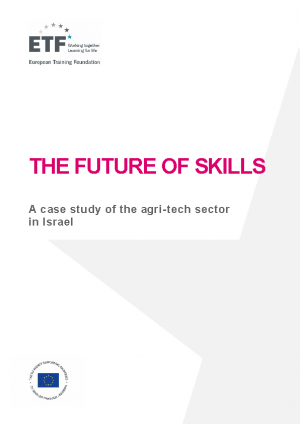The future of skills: A case study of the agri-tech sector in Israel
Download the Summary Note
Profound changes are being experienced in all sectors world-wide due to the technological revolution, digitalisation, climate change, globalisation, etc. As we know little about the skills needed to keep pace with these transformations, a recent ETF study attempted to identify the emerging skills needs in Israel’s agri-tech sector. It developed an innovative methodology, combining conventional research techniques with text mining of big data. The new methodology has proved that it can provide a comprehensive picture of the emerging skills needed in the future that can also be applied to other sectors.
Israel has always relied on technological progress in agriculture to deal with its water-scarcity and arid or semi-arid soil. But accelerated changes in the agri-tech sector could lead to a potential skills shortage due to a number of factors and despite the presence of a developed technical and vocational education and training (TVET) network.
Drivers of change in agri-tech
Trade, global value chains, digital tools, the greening of the economy, and climate change are all drivers of change affecting the field of agri-tech in Israel, but it is technology that is the most important force; the report therefore focuses more on new technologies and their impact on the sector.
Technologies such as irrigation and water treatment systems, computer vision, or image processing systems are already transforming the agri-tech sector, but artificial intelligence and vertical/indoor growing, in particular, will disrupt and alter the production and business models deeply in the sector. Existing technologies already in place could further transform the sector towards precision agriculture if a large number of farms adopt them. Because Israel has a favourable innovation ecosystem and culture as well as the capacity to attract private and public investment, it has the potential to create new jobs, even if the country’s rate of innovation in agri-tech has slowed down in recent years.
Emerging skills needs
The changes above are affecting many jobs, by altering their tasks partially or completely, and some new jobs are also emerging. As a result, skills requirements from workers are changing as well. The most interesting developments lie in transversal skills; multidisciplinary competences will be increasingly relevant, often with a core competence in one area, but with skills and knowledge in other areas. Transversal skills in technologies are necessary because so many are now interrelated. As technical innovation grows, the competences needed from workers is changing too, creating entirely new jobs, such as LED light experts for indoor growing. More specialists in biotechnology or engineering will be in demand, but also specialised professionals from the traditional sector, such as agronomists, with more precise technical skills. But there will be less work for manual labourers, for example plant and machine operators, as requirements are shifting from manual labour to knowledge and management. Finally, business, marketing and sales, or export and trade roles will also be needed, requiring a number of soft skills such as communication and teamwork, particularly if people have technical backgrounds.
Suggestions for future policies and practices
Policies and practices should be put in place to ensure that workers can acquire the newly emerging skills needed in the agri-tech sector in Israel. Among these, the following actions could be the first and most helpful:
- developing learning modules for upskilling/reskilling professionals in the field;
- identifying gaps in the existing curricula;
- developing new qualifications in partnership with the universities, TVET providers and companies in the sector;
- better career guidance and information about emerging job and career opportunities, and most important skills to acquire;
- mainstreaming existing good practices in the acquisition of newly needed skills;
- establishing a system of collaboration between enterprises and education providers.
Did you like this publication? If you would like to be notified when new content like this is published, subscribe to receive our email alerts.
